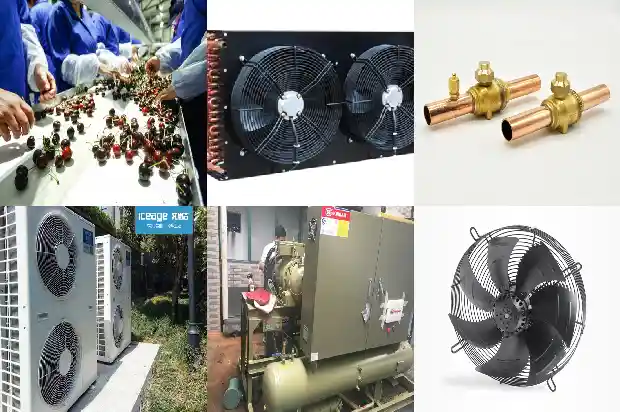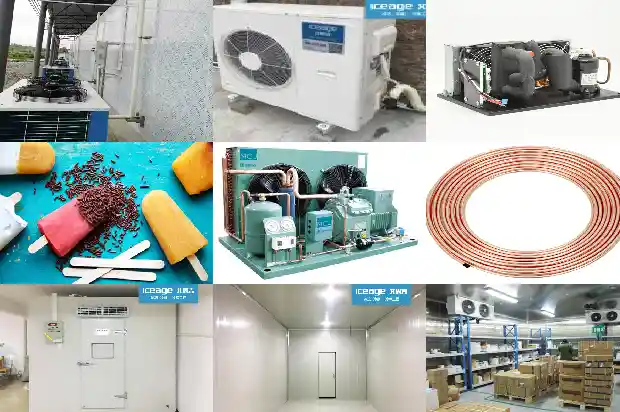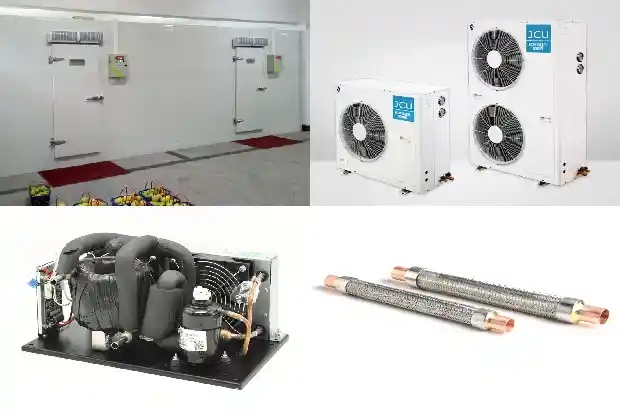Eight Misconceptions in Refrigeration Equipment Repair
2025-01-09
Many refrigeration repair technicians, when they encounter an internal leak in a refrigerator, directly add a condenser mesh without conducting a pressure test. Soon, there is a leakage again, and it turns out to be a leak in the evaporator of the freezer compartment. It doesn't mean that just because the compressor is running, the compressor is definitely okay. When there is a leakage in the system, the compressor can still operate. However, when cutting open the pipeline to test the compressor, there is no gas in the compressor. After the customer leaves, if you notify the customer again, it will be hard to explain clearly! In the freezer system, it's either a leak or a blockage.
Myth 2: Just having one compressor, then weld it right away
It doesn't mean that just because the refrigerant in the system has been released, welding will be completely safe. Some compressors "contain" residual freon. Sometimes, when welding the remaining connection pipe of the compressor, expanded gas may spray out. During welding, no part of the body should be close to the pipe opening.
Myth 3: The bigger the replaced compressor, the better
The requirements for freezer repair are more stringent than those for air conditioners. The matching between the compressor and the system should be reasonable. Under the condition that the condenser, evaporator, capillary, and the amount of freon added are fixed, if the replaced compressor is too large, the compressor will heat up and its lifespan will not be very long.
Myth 4: Any liquid sprayed out by the compressor must be water
Compressor oil will gush out along with the spray. At this time, some people may think it is water, but this is not necessarily the case. How to distinguish whether it is oil or water? Use a welding torch to burn it.
Myth 5: Aluminum pipes can't be welded
Why do some people say that aluminum pipes can't be welded? Because aluminum welding rods are very expensive and they don't want to buy them. Refrigeration repair requires welding skills. If the heat is in place, there is no problem. Beginners usually don't have enough heat control. They are always worried about burning through the copper pipe. As a result, the welded joints look like goosebumps. This phenomenon can often be seen at the welded joints of air conditioner compressors. These pipes usually have a thick wall and need more intense heat!
Myth 6: Adding freon without adding oil
Many people have been engaged in refrigeration repair for years without adding or changing the oil in the compressor! They only replace the compressor until it breaks down. Oil is more expensive than freon, but it is cheaper than the compressor! After the system of the refrigeration equipment leaks, the compressor oil sprays out. After repairing the system leak, add compressor oil appropriately or change the oil. If you turn on the compressor and cover the high - pressure pipe opening with your hand, and feel dry air or dry black dust, be alert that the compressor may be out of oil. As long as there is a little oil in the compressor, it can run. But when there is no oil left at all, the cylinder will seize and it can't be repaired!
Myth 7: Frequently adding freon
The refrigerant is something that neither evaporates nor consumes. Many repair workers add freon when they see that the refrigeration equipment is not cooling. This is not advisable. The problem should be determined first, and then the repair should be carried out.
Myth 8: Copper pipes are better than iron pipes for freezer coil winding
Copper pipes are indeed corrosion - resistant when used in refrigeration equipment. If the pipe wall is thick enough, the pipe can last a lifetime. However, after many tests, the frost formation on the iron - pipe - wound freezer is more obvious than that on the copper - pipe - wound one. The reason is that copper pipes have good heat dissipation performance. When used in the evaporator, the heat preservation is not good. So, the frost formation on copper pipes doesn't seem as ideal as that on iron pipes!

Myth 2: Just having one compressor, then weld it right away
It doesn't mean that just because the refrigerant in the system has been released, welding will be completely safe. Some compressors "contain" residual freon. Sometimes, when welding the remaining connection pipe of the compressor, expanded gas may spray out. During welding, no part of the body should be close to the pipe opening.
Myth 3: The bigger the replaced compressor, the better
The requirements for freezer repair are more stringent than those for air conditioners. The matching between the compressor and the system should be reasonable. Under the condition that the condenser, evaporator, capillary, and the amount of freon added are fixed, if the replaced compressor is too large, the compressor will heat up and its lifespan will not be very long.

Myth 4: Any liquid sprayed out by the compressor must be water
Compressor oil will gush out along with the spray. At this time, some people may think it is water, but this is not necessarily the case. How to distinguish whether it is oil or water? Use a welding torch to burn it.

Myth 5: Aluminum pipes can't be welded
Why do some people say that aluminum pipes can't be welded? Because aluminum welding rods are very expensive and they don't want to buy them. Refrigeration repair requires welding skills. If the heat is in place, there is no problem. Beginners usually don't have enough heat control. They are always worried about burning through the copper pipe. As a result, the welded joints look like goosebumps. This phenomenon can often be seen at the welded joints of air conditioner compressors. These pipes usually have a thick wall and need more intense heat!
Myth 6: Adding freon without adding oil
Many people have been engaged in refrigeration repair for years without adding or changing the oil in the compressor! They only replace the compressor until it breaks down. Oil is more expensive than freon, but it is cheaper than the compressor! After the system of the refrigeration equipment leaks, the compressor oil sprays out. After repairing the system leak, add compressor oil appropriately or change the oil. If you turn on the compressor and cover the high - pressure pipe opening with your hand, and feel dry air or dry black dust, be alert that the compressor may be out of oil. As long as there is a little oil in the compressor, it can run. But when there is no oil left at all, the cylinder will seize and it can't be repaired!
Myth 7: Frequently adding freon
The refrigerant is something that neither evaporates nor consumes. Many repair workers add freon when they see that the refrigeration equipment is not cooling. This is not advisable. The problem should be determined first, and then the repair should be carried out.
Myth 8: Copper pipes are better than iron pipes for freezer coil winding
Copper pipes are indeed corrosion - resistant when used in refrigeration equipment. If the pipe wall is thick enough, the pipe can last a lifetime. However, after many tests, the frost formation on the iron - pipe - wound freezer is more obvious than that on the copper - pipe - wound one. The reason is that copper pipes have good heat dissipation performance. When used in the evaporator, the heat preservation is not good. So, the frost formation on copper pipes doesn't seem as ideal as that on iron pipes!
Related Articles
- What Misconceptions Should Be Avoided in Low - temperature Refrigeration System Repairs
- Have You Encountered the Three Common Problems of Refrigeration Compressors?
- How to Calculate Refrigeration Load? And What Are the Issues?
- What to Do if the Compressor of a Frozen and Refrigerated Display Cabinet Runs but the Refrigeration Effect Is Poor?
- Instructions for Welding and Drainage in the Installation of Refrigeration Equipment Pipelines
- Common Pressure Valves and Protection Devices in Refrigeration Units
- Precautions for Using Rotary Refrigeration Compressors
- Essential for Maintenance! Parameters and Phenomena of Normal Operation of Refrigeration and Heating Systems
- Composition and Common Faults of Screw Refrigeration Compressors
- How to Read the High - and Low - Pressure Gauges of Refrigeration Air - conditioners?
- What is Cascade Refrigeration?
- Introduction to Control Valves in Refrigeration Systems
- Welding Equipment Used in Refrigeration System Maintenance
- Where Lie the Key Construction Technologies of the Ammonia Refrigeration System?
- What to Do When a Refrigeration Unit Malfunctions?
- Could a Tiny Copper Tube Cause a Multi - split Air Conditioner to Stop Cooling? Refrigeration Workers Must Pay Attention!
- Has Your Refrigeration System Experienced "Oil Carry - over"?
- Basic Knowledge of Valve - type Components in Refrigeration Systems (Technical Sharing)
